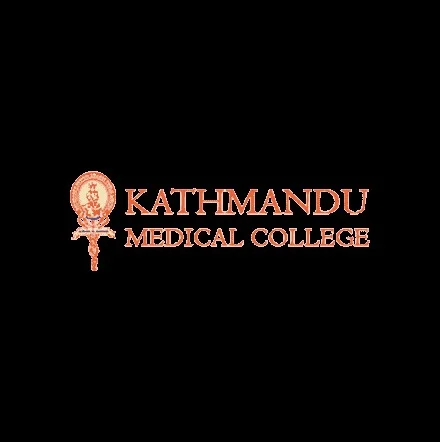
Kathmandu Medical College Teaching Hospital: MBBS Admission, Fees, Courses, Ranking
MBBS in Nepal is emerging as a popular choice among Indian students seeking a quality and cost-effective MBBS Abroad program. Among the top-ranked institutions, Kathmandu Medical College in Nepal stands out for its internationally recognized curriculum, modern clinical infrastructure, and English-medium instruction. The college offers a student-friendly environment, especially tailored for MBBS in Nepal for Indian Students, with a curriculum that aligns well with the NMC (MCI) guidelines, making it an excellent pathway for those aiming to clear FMGE/NExT and practice in India. Known for its affordable tuition, flexible admission process, and a diverse academic environment, Kathmandu Medical College is among the most trusted names when considering Nepal MBBS colleges. It provides all essential facilities including quality hostel accommodation, Indian food, and a strong academic support system. Students looking for a low-cost, recognized medical degree should explore the options and benefits of MBBS in Nepal Fees and opportunities at KMC.
Overview of Kathmandu Medical College
KMC is a private medical college in Nepal that provides quality medical education and healthcare services. The college is permanently affiliated to Kathmandu University and fully recognized by the Nepal Medical Council. It is also recognized by international bodies such as the Medical Council of India, the Sri Lanka Medical Council, and the General Medical Council, enhancing its credibility and appeal to foreign students. The college offers a five-and-a-half-year MBBS program, including an internship of 1 year, focusing on basic medical science and interdepartmental integration. The academic year is structured to provide a balanced mix of theoretical knowledge and practical experience.
The Faculty of Medicine at KMC is committed to providing a comprehensive medical education that combines theoretical knowledge with practical application. The college offers state-of-the-art facilities, including well-equipped laboratories, a vast library, and access to the Kathmandu Medical College and Teaching Hospital for clinical training. The faculty members are highly qualified and experienced, ensuring that students receive quality education and mentorship. The curriculum is designed to meet international standards, preparing students for global medical practice.
Studying at Kathmandu Medical College Faculty of Medicine
The Faculty of Medicine at KMC emphasizes a curriculum that integrates basic medical science and interdepartmental integration. Students engage in a variety of learning methodologies, including lectures, seminars, and hands-on clinical training at the Kathmandu Medical College and Teaching Hospital. The faculty comprises experienced professionals dedicated to fostering a supportive and challenging academic environment. The college is recognized by the Nepal Medical Council and is listed in the World Directory of Medical Schools, ensuring that graduates are eligible for licensure and practice in various countries.
Why Kathmandu Medical College is Ideal for Indian Students
Kathmandu Medical College (KMC) is an ideal choice for Indian students planning to pursue MBBS in Nepal, offering numerous advantages. Its geographical proximity to India and shared cultural affinities make Nepal a convenient and comfortable destination for Indian students. The MBBS curriculum at KMC is recognized by the Medical Council of India, enabling graduates to practice in India after clearing the necessary licensing examinations.
Additionally, the course fees at KMC are significantly lower than those of many private medical colleges in India, making it a more affordable option. The admission process is further simplified as Indian students do not require a visa to study in Nepal. With English being the medium of instruction, language barriers are eliminated, ensuring a smooth learning experience. These factors collectively make Kathmandu Medical College an attractive and practical choice for Indian students seeking quality medical education abroad.
Want To Study in Kathmandu Medical College?

Affiliation and Recognition of Kathmandu Medical College
Affiliation with Kathmandu University: KMC is permanently affiliated with Kathmandu University, ensuring that its curriculum and academic standards align with the university’s guidelines.
Recognition by the Medical Council of Nepal (NMC): The college is fully recognized by the NMC, which oversees medical education and practice standards in Nepal.
Listing in the WHO’s World Directory of Medical Schools: Since June 2002, KMC has been listed in the World Health Organization’s World Directory of Medical Schools, indicating its adherence to global medical education standards.
Recognition by the Medical Council of India (MCI): KMC is recognized by the MCI, allowing its graduates to pursue medical practice or further studies in India.
Recognition by the Sri Lanka Medical Council (SLMC): The college holds recognition from the SLMC, enabling its graduates to practice medicine in Sri Lanka.
Recognition by the General Medical Council (GMC) of the UK: KMC’s recognition by the GMC allows its graduates to pursue medical careers in the United Kingdom.
Want To Study in Kathmandu Medical College?
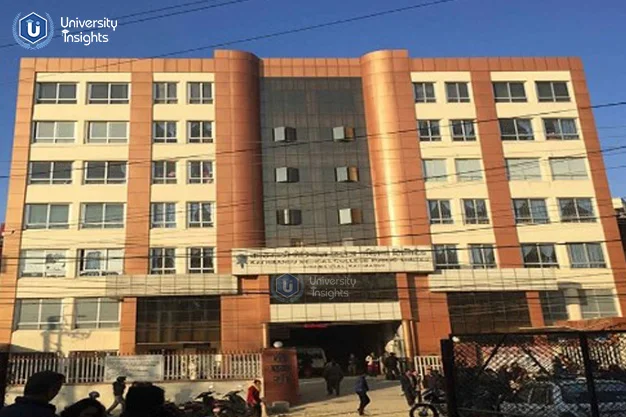
Why Study MBBS at Kathmandu Medical College?
Benefits of MBBS in Kathmandu Medical College for Indian Students
Proximity and Cultural Affinity: Nepal’s geographical closeness to India and shared cultural aspects make it a comfortable destination for Indian students pursuing medical education.
No Visa Requirement: Indian students do not need a visa to study in Nepal, simplifying the admission and relocation process.
English-Medium Instruction: The MBBS program is taught in English, eliminating language barriers for Indian students.
Recognized Degree: The MBBS degree from KMC is recognized by the National Medical Commission (NMC) of India, allowing graduates to practice in India after meeting the necessary requirements.
Affordable Tuition Fees: The cost of medical education at KMC is comparatively lower than many private medical colleges in India.
Highlights of Studying MBBS in Nepal
Quality Education: Nepalese medical colleges, including KMC, offer quality education with a curriculum that aligns with international standards.
Clinical Exposure: Students gain extensive clinical experience through affiliations with teaching hospitals, enhancing practical skills.
Diverse Patient Demographics: Exposure to a wide range of medical conditions due to Nepal’s diverse population.
Global Recognition: Degrees from Nepalese medical colleges are recognized by global medical councils, facilitating opportunities worldwide.
Kathmandu Medical College Facilities for MBBS Students
Modern Infrastructure: KMC boasts state-of-the-art facilities, including well-equipped laboratories and lecture halls.
Comprehensive Library: A vast collection of medical literature and digital resources supports student learning and research.
Teaching Hospital: The attached teaching hospital provides hands-on clinical training under the supervision of experienced professionals.
Hostel Accommodation: Separate hostels for male and female students with amenities like internet access, study rooms, and recreational facilities.
Unique Advantages of KMC MBBS Course
Integrated Curriculum: The MBBS program integrates basic medical sciences with clinical practice, ensuring a holistic medical education.
Experienced Faculty: Students learn from a team of highly qualified and experienced faculty members dedicated to medical education.
Research Opportunities: KMC encourages student participation in research projects, fostering a culture of inquiry and innovation.
Community Engagement: The college emphasizes community-based learning, allowing students to engage with and serve local communities.
Extracurricular Activities: A range of extracurricular activities and student organizations promote personal development and leadership skills.
Want To Study in Kathmandu Medical College?
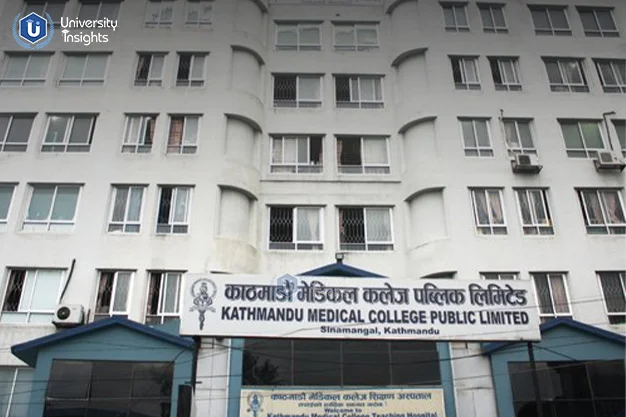
Quick Highlights About Kathmandu Medical College
Kathmandu Medical College Overview
| Particulars | Details |
|---|---|
| Established | 1997 |
| Location | Kathmandu, Nepal |
| University Type | Private Medical College |
| Recognition | Medical Council of Nepal, WHO’s World Directory of Medical Schools, National Medical Commission (NMC), International Medical Education Directory (IMED) |
| MBBS Tuition Fees | Approx. INR 60-65 Lakhs for the full course |
| Medium of Instruction | English |
| Total MBBS Duration | 5.5 years (including 1 year of compulsory internship) |
| Campus | Modern facilities with a teaching hospital attached |
| Eligibility | 50% in 10+2 with PCB (Physics, Chemistry, Biology); Minimum age of 17 years |
| NEET Requirement | Mandatory for Indian students |
| IELTS/TOEFL | Not required |
| Medium of Teaching | English |
Want To Study in Kathmandu Medical College?
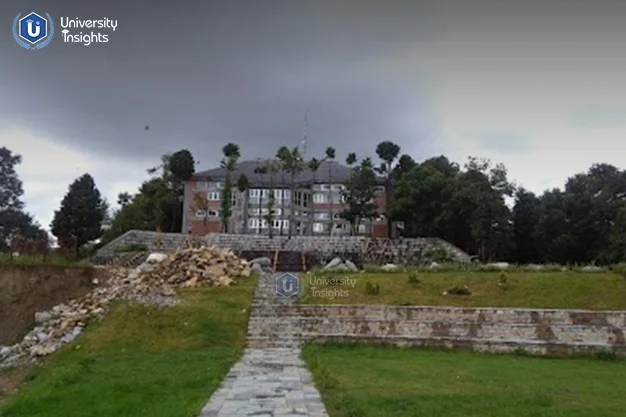
Advantages of MBBS at Kathmandu Medical College
Kathmandu Medical College (KMC), established in 1997, is a private medical school located in Kathmandu, Nepal. Affiliated with Kathmandu University, KMC is fully recognized by the Medical Council of Nepal and is listed in the World Directory of Medical Schools electronic format. The college offers an MBBS program that mainly focuses on basic medical sciences during the initial years, providing a strong foundation for aspiring doctors. The principal of Kathmandu Medical College is a distinguished member of the Nepal Society of Obstetricians and Gynecologists, reflecting the institution’s commitment to excellence in medical education.
Why Choose Kathmandu Medical College Faculty of Medicine Kathmandu
Affiliation and Recognition: The college is affiliated with Kathmandu University and is fully recognized by the Medical Council of Nepal, ensuring that the degrees awarded are respected and acknowledged globally.
Experienced Faculty: Students at Kathmandu Medical College benefit from a team of experienced educators and medical professionals dedicated to providing quality education.
Comprehensive Curriculum: The MBBS program offers a curriculum that mainly focuses on basic medical sciences in the initial years, preparing students thoroughly for clinical practice.
State-of-the-Art Facilities: The college is equipped with modern laboratories, a well-stocked library, and advanced medical equipment to support effective learning and research.
Benefits of Kathmandu Medical College Nepal for Indian Students
Proximity and Cultural Similarities: Located in Kathmandu, the college offers Indian students the advantage of studying in a neighboring country with cultural and linguistic similarities, making the transition smoother.
No Visa Requirement: Indian students do not require a visa to study in Nepal, simplifying the admission process and reducing associated costs.
Affordable Education: The cost of medical education at KMC is relatively lower compared to private medical colleges in India, making it a cost-effective option for quality education.
Recognized Degree: The MBBS degree from KMC is recognized by the Medical Council of India, allowing graduates to pursue further studies or practice in India after meeting the necessary requirements.
Key Reasons to Study MBBS in Nepal
Quality Education: Nepal offers quality medical education with curricula that are on par with international standards, ensuring comprehensive medical training.
English-Medium Instruction: The medium of instruction is English, eliminating language barriers for international students and facilitating better understanding.
Diverse Clinical Exposure: Students gain exposure to a wide range of medical conditions and cases, enhancing their clinical skills and experience.
Safe and Welcoming Environment: Nepal is known for its hospitality and safety, providing a conducive environment for international students to live and study.
How KMC Nepal Enhances the MBBS Experience
Student-Centric Approach: KMC focuses on the holistic development of students, encouraging participation in research, seminars, and community health programs.
Modern Infrastructure: The college boasts modern classrooms, simulation labs, and a teaching hospital that provide hands-on learning experiences.
Extracurricular Activities: Students are encouraged to engage in various extracurricular activities, promoting a balanced and enriching college life.
Support Services: KMC offers support services, including counseling and mentorship programs, to assist students in their academic and personal growth.
Want To Study in Kathmandu Medical College?
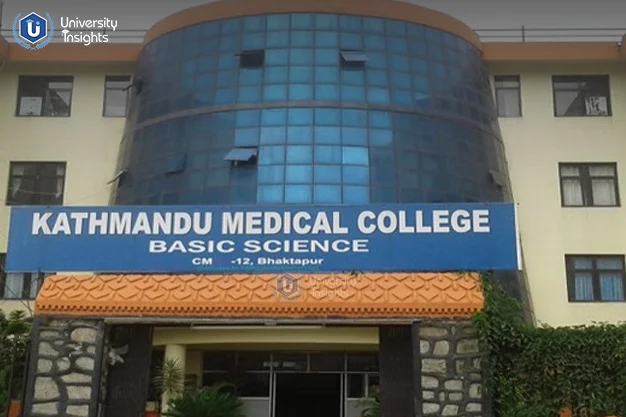
Duration of MBBS in Kathmandu Medical College
Kathmandu Medical College (KMC), a private medical school located in Kathmandu, Nepal, offers a comprehensive MBBS program designed to produce competent and compassionate medical professionals. Affiliated with Kathmandu University and fully recognized by the Medical Council of Nepal, KMC provides a curriculum that integrates basic medical sciences with extensive clinical training.
Total Duration of MBBS Course at KMC Nepal
The MBBS program at Kathmandu Medical College spans five and a half years, comprising:
4.5 years of academic education: This period is divided into nine semesters, each lasting six months, focusing on both basic and clinical medical sciences.
1 year of compulsory internship: Following the completion of academic studies, students must undertake a one-year internship to gain practical experience in various medical disciplines.
MBBS Course Breakdown in Kathmandu Medical College
The MBBS curriculum at KMC is structured to provide a balanced education in medical sciences:
Basic Medical Sciences (First 2 years): Subjects include Anatomy, Physiology, Biochemistry, Pathology, Pharmacology, and Microbiology. This phase emphasizes foundational knowledge and interdepartmental integration.
Clinical Sciences (Next 2.5 years): Students engage in clinical rotations across various specialties such as Internal Medicine, Surgery, Pediatrics, Obstetrics and Gynecology, Psychiatry, Dermatology, Radiology, Anesthesiology, ENT, Ophthalmology, Orthopedics, Dentistry, and Emergency Medicine.
Internship (Final 1 year): The compulsory internship involves hands-on training in different medical departments, allowing students to apply their theoretical knowledge in real-world settings.
Academic Timeline for MBBS Students at Kathmandu University
The following table outlines the academic timeline for MBBS students at KMC:
| Phase | Duration | Focus Areas |
|---|---|---|
| Phase I | 2 years | Basic Medical Sciences: Anatomy, Physiology, Biochemistry, Pathology, Pharmacology, Microbiology |
| Phase II | 1 year | Clinical Sciences: Internal Medicine, Surgery, Pediatrics, Obstetrics and Gynecology, Community Medicine, Forensic Medicine |
| Phase III | 1.5 years | Advanced Clinical Sciences: Psychiatry, Dermatology, Radiology, Anesthesiology, ENT, Ophthalmology, Orthopedics, Dentistry, Emergency Medicine |
| Internship | 1 year | Rotational postings in various medical departments for practical experience |
Clinical Training During MBBS in Nepal
Clinical training is a pivotal component of the MBBS program at Kathmandu Medical College. Starting from the third year, students participate in clinical rotations within KMC’s teaching hospitals, gaining exposure to diverse medical cases and patient interactions. This hands-on experience is crucial for developing clinical skills, decision-making abilities, and professional competencies essential for a successful medical career.
By integrating rigorous academic instruction with practical clinical training, Kathmandu Medical College ensures that its graduates are well-prepared to meet the healthcare needs of the community and excel in the medical profession.
Want To Study in Kathmandu Medical College?
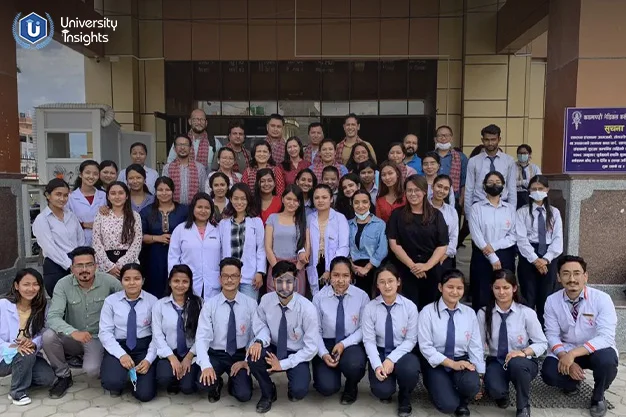
Faculties of Kathmandu Medical College Faculty of Medicine
Kathmandu Medical College (KMC), located in Sinamangal, Kathmandu, is a prestigious private medical institution affiliated with Kathmandu University. Established in 1997, the college is renowned for its commitment to providing world-class medical education and healthcare services. The Faculty of Medicine at KMC is the backbone of the institution, encompassing various departments and specialized faculties that focus on delivering a comprehensive and dynamic medical education.
List of Departments in Kathmandu Medical College
KMC hosts a wide range of departments, each catering to a specific medical specialty. These departments ensure students gain in-depth knowledge across all aspects of medicine, preparing them for diverse medical careers. The following are the key departments:
- Anatomy: Understanding the structure of the human body.
- Biochemistry: Study of chemical processes within living organisms.
- Community Medicine: Focuses on public health and preventive medicine.
- Microbiology: Study of microorganisms and their role in health and disease.
- Pathology: Examination of the causes and effects of diseases.
- Pharmacology: Study of drugs and their effects on the human body.
- Physiology: Understanding the functions of the human body.
- Forensic Medicine: Medical knowledge applied to legal investigations.
- Internal Medicine: Covers diagnosis and treatment of adult diseases.
- Surgery: Specializes in operative procedures to treat diseases and injuries.
- Pediatrics: Focuses on the health and diseases of children.
- Obstetrics and Gynecology: Concerns pregnancy, childbirth, and female reproductive health.
- Orthopedics: Diagnosis and treatment of musculoskeletal system disorders.
- Ophthalmology: Deals with eye health and visual impairments.
- Otorhinolaryngology (ENT): Covers ear, nose, and throat health.
- Dermatology: Treats skin conditions and disorders.
- Psychiatry: Focuses on mental health and behavioral disorders.
- Radiology: Imaging techniques for diagnosis and treatment.
- Anesthesiology: Ensures pain management and patient safety during surgeries.
- Emergency Medicine: Immediate care for acute medical issues.
- Specialized Departments: Neurology, Cardiology, Nephrology, Pulmonology, Gastroenterology, Endocrinology, Oncology, Rheumatology, Urology, and others.
Medical Faculty Overview in Kathmandu Medical College Nepal
The faculty at Kathmandu Medical College consists of highly qualified professionals dedicated to delivering excellence in medical education. The team includes experienced professors, associate professors, assistant professors, and lecturers. Many faculty members have extensive academic and clinical experience in top medical institutions in Nepal, India, and other countries, ensuring students receive quality guidance in their academic and practical learning.
Highlights of KMC’s faculty:
- Extensive experience in teaching and clinical practice.
- Active involvement in research and publication in reputed medical journals.
- Commitment to student mentorship and skill development.
- Incorporation of modern teaching methods, such as integrated and problem-based learning.
Supporting Faculties at Kathmandu Medical College (KMC) Nepal
Apart from the core medical departments, KMC provides supporting faculties that enrich the learning environment and help students excel in their studies:
- Medical Education Department: Focuses on curriculum development, faculty training, and innovative teaching methods.
- Research Department: Encourages students and faculty to engage in medical research, providing resources and guidance for publication in international journals.
- Biomedical Engineering: Supports the maintenance and optimal functioning of medical equipment used in labs and clinical training.
- Library Services: Features an extensive collection of textbooks, research journals, and e-learning resources to support medical education.
Specialized MBBS Course Faculties at Kathmandu Medical College (KMC)
The MBBS program at Kathmandu Medical College is designed to ensure a well-rounded medical education through specialized training and innovative teaching methods.
- Clinical Skills Laboratory: This lab simulates clinical scenarios, allowing students to practice essential medical procedures in a controlled and supervised environment.
- Community Medicine Faculty: Focuses on understanding public health challenges, preparing students to address community health issues and provide preventive care.
- Integrated Teaching: Combines basic sciences and clinical subjects to provide a seamless understanding of medical knowledge. For example, topics like the cardiovascular system are taught through a combination of anatomy, physiology, pathology, and pharmacology.
- Advanced Clinical Training: Students gain hands-on experience in affiliated hospitals, including the Kathmandu Medical College Teaching Hospital, where they work under the supervision of senior clinicians.
By offering a diverse array of departments and faculties, Kathmandu Medical College provides a nurturing environment where students can build their medical knowledge, hone clinical skills, and prepare for a fulfilling career in medicine.
Want To Study in Kathmandu Medical College?
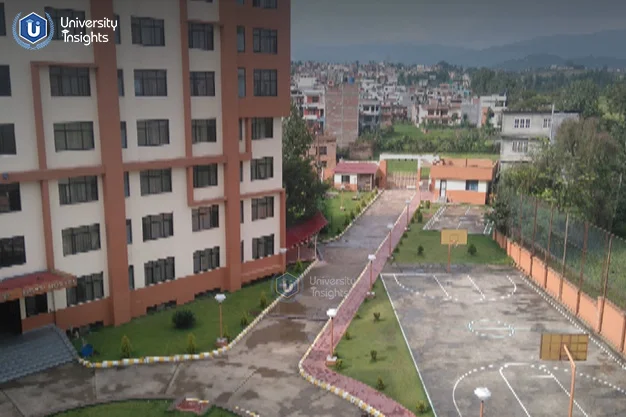
Kathmandu Medical College Fees Structure 2025
Kathmandu Medical College (KMC) in Kathmandu, Nepal, is a prominent institution offering MBBS programs to aspiring medical students. Affiliated with Kathmandu University, KMC provides a comprehensive medical education recognized by the National Medical Commission (NMC) of India and the World Health Organization (WHO).
Detailed Kathmandu Medical College Fees in Rupees
| Year | Tuition Fee (INR) | Hostel Fee (INR) | Total Annual Fee (INR) |
|---|---|---|---|
| 1st Year | ₹26,00,000 | ₹1,44,000 | ₹28,04,000 |
| 2nd Year | ₹20,00,000 | ₹1,44,000 | ₹22,04,000 |
| 3rd Year | ₹9,00,000 | ₹1,44,000 | ₹11,04,000 |
| 4th Year | — | ₹1,44,000 | ₹2,04,000 |
| 5th Year | — | ₹1,44,000 | ₹2,04,000 |
| 6th Year | — | ₹000 | ₹000 |
| Total | ₹55,00,000 | ₹7,20,000 | ₹65,20,000 |
MBBS Fee Structure of KMC Nepal
The fee structure for the MBBS program at KMC Nepal is as follows:
- Tuition Fee: $76,700 (approximately ₹65,20,000) for the entire course.
- Hostel Fee: $1,800 per annum (approximately ₹1,44,000) for double occupancy.
- Mess Charges: $840 per annum (approximately ₹67,200).
Note: The hostel fee includes accommodation, electricity, and water charges. Food expenses are additional.
Other Charges in Kathmandu Medical College Fee Structure
In addition to the tuition and hostel fees, students are required to pay the following:
- Registration Fee: ₹23,500 (or actual USD 400) for Kathmandu University.
- Affiliation Fee: ₹62,000 (or actual USD 775) for Kathmandu University.
- NMC Registration Fee: ₹3,200 (or actual USD 38).
- Admission Form Charge: ₹5,000.
- Health Insurance: Approximately ₹30,000 per annum.
Affordable Fees for Indian Students at KMC
KMC offers a cost-effective MBBS program compared to many private medical colleges in India. The total fee for the entire course, including tuition and hostel, is approximately ₹55,00,000 for Indian students. This affordability, combined with the college’s quality education and international recognition, makes it an attractive option for students aiming to study MBBS abroad.
Note: The fee structure is subject to change; the amounts mentioned are approximate and based on the latest available data.
Want To Study in Kathmandu Medical College?
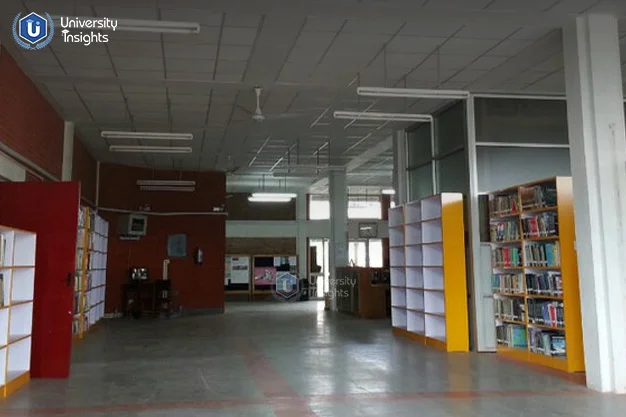
Kathmandu Medical College Ranking 2025
| Ranking Type | Rank |
|---|---|
| Global Ranking | 4,989 |
| Nepal Country Ranking | 3 |
Ranking of Kathmandu Medical College Faculty of Medicine
The Faculty of Medicine at Kathmandu Medical College is integral to the institution’s overall ranking. While specific rankings for the Faculty of Medicine are not separately listed, the college’s national ranking of 3 reflects the quality of education and training provided.
Factors Influencing the Ranking of KMC Nepal
Several factors contribute to the ranking of Kathmandu Medical College:
Academic Reputation: The college is known for its rigorous curriculum and high academic standards, attracting students from various countries.
Clinical Exposure: KMC provides extensive clinical training through its affiliated teaching hospital, offering students hands-on experience in real-world medical settings.
Faculty Expertise: The institution boasts a team of experienced faculty members who are dedicated to delivering quality medical education.
Research Output: Active participation in medical research enhances the college’s reputation and ranking.
Accreditation and Recognition: Affiliations with reputable bodies like Kathmandu University and recognition by the Nepal Medical Council and the Medical Council of India bolster the college’s standing.
These factors collectively influence the ranking of Kathmandu Medical College, making it a preferred choice for students aiming to study MBBS in Kathmandu.
Want To Study in Kathmandu Medical College?
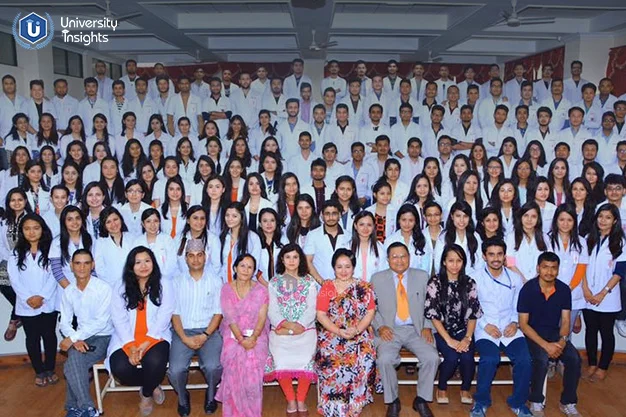
Eligibility Criteria to Study MBBS at Kathmandu Medical College
Age Requirement: The candidate must be at least 17 years of age at the time of admission or on or before 31st December of the admission year.
Educational Qualifications:
- Completion of 10+2 education or equivalent with Physics, Chemistry, Biology, and English as core subjects.
- A minimum aggregate of 50% marks in PCB (Physics, Chemistry, Biology) for General category candidates.
- A minimum aggregate of 40% marks in PCB for SC/ST/OBC category candidates.
NEET Qualification: Candidates must have qualified the National Eligibility cum Entrance Test (NEET) with the following minimum qualifying marks:
Category NEET 2025 Qualifying Marks General (UR/EWS) 720-162 OBC/SC/ST 161-127 General-PH 161-144 SC/OBC-PH 143-127 ST-PH 142-127
Key Criteria for Kathmandu Medical College Admission
For admission to Kathmandu Medical College, candidates should:
- Meet the age and educational qualifications as mentioned above.
- Have a valid NEET score with the required qualifying marks.
- Submit all necessary documents, including:
- Valid passport with at least 18 months validity.
- 10th and 12th standard certificates and mark sheets.
- Birth certificate.
- Character certificate from the previous institution.
- Proof of financial support to cover tuition and living expenses.
- Obtain an official invitation letter from Kathmandu Medical College.
- Complete the visa application process as per Nepalese regulations.
Eligibility for Indian Students in Kathmandu Medical College
Indian students seeking admission to Kathmandu Medical College must:
- Fulfill the age and educational criteria specified above.
- Have a valid NEET score with the required qualifying marks.
- Provide all necessary documents, including:
- Valid passport.
- Academic certificates and mark sheets.
- Birth certificate.
- Character certificate.
- Proof of financial support.
- Obtain an official invitation letter from Kathmandu Medical College.
- Complete the visa application process as per Nepalese regulations.
Qualifications Needed for MBBS at KMC Nepal
To be eligible for the MBBS program at Kathmandu Medical College, candidates must:
- Be at least 17 years old at the time of admission or on or before 31st December of the admission year.
- Have completed 10+2 education or equivalent with Physics, Chemistry, Biology, and English as core subjects.
- Achieve a minimum aggregate of 50% marks in PCB for General category candidates and 40% for SC/ST/OBC category candidates.
- Qualify the NEET exam with the specified minimum qualifying marks.
- Provide all necessary documents, including academic certificates, passport, and other identification proofs.
- Undergo a medical fitness examination as per the college’s requirements.
By meeting these criteria, candidates can pursue their MBBS studies at Kathmandu Medical College, benefiting from quality medical education in a conducive environment.
Want To Study in Kathmandu Medical College?
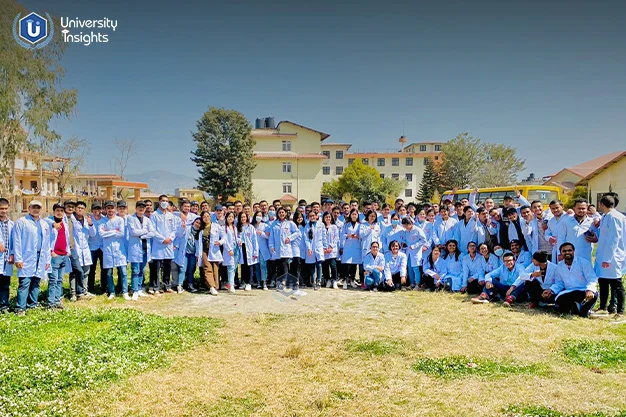
Admission Process of Kathmandu Medical College
Step-by-Step Process for Kathmandu Medical College Admission
Understand the Eligibility Requirements:
- Age Requirement: Candidates must have completed 17 years of age by December 31 of the admission year.
- Academic Qualifications:
- Completion of higher secondary education (10+2) or equivalent, including Physics, Chemistry, Biology, and English as mandatory subjects.
- Minimum aggregate of 50% in these subjects. Some categories (e.g., reserved) may have relaxed criteria.
- Entrance Examination:
- Indian students must qualify for NEET (National Eligibility cum Entrance Test).
- All students must take the Medical Education Commission Entrance Exam (MECEE-BL), which is mandatory for admission to medical colleges in Nepal.
Application Process:
- Application Form:
- The application form can be accessed online through the official Kathmandu Medical College website or in person from the admissions office.
- Documents Required:
- High school and higher secondary certificates and mark sheets (attested copies).
- Valid NEET scorecard for Indian students.
- Birth certificate or other age proof.
- Passport (for international students) or national identification documents.
- Recent passport-sized photographs (as per specifications).
- Ensure all documents are authenticated and translated into English (if not already) for international candidates.
- Application Form:
Entrance Exams:
- Register for the MECEE-BL exam on the official MEC Nepal portal.
- For Indian students, ensure NEET results meet the college’s cutoff marks.
- Prepare thoroughly as the exams test foundational knowledge in Physics, Chemistry, and Biology.
Shortlisting and Counseling:
- After exams, candidates are shortlisted based on their scores.
- A merit list is prepared, and qualified students are invited for counseling sessions.
- During counseling, candidates are briefed about the program, and they can choose Kathmandu Medical College as their preferred institution.
Admission Offer and Confirmation:
- Selected candidates will receive a formal admission offer letter from the college.
- The letter outlines tuition fees, deadlines, and enrollment formalities.
- Candidates must accept the offer within the specified timeframe by signing the acceptance form and paying the initial admission fee.
Payment of Fees:
- Kathmandu Medical College is a private medical institution; hence, fees must be paid in installments as per the structure provided.
- Keep a record of receipts for all payments.
Visa Process for International Students:
- Non-Nepalese students must apply for a student visa at the Nepalese embassy in their country.
- Required documents include an admission letter, fee receipts, passport, and proof of financial capability.
Enrollment and Orientation:
- Once in Kathmandu, complete final enrollment at the college’s admissions office.
- Attend orientation programs that introduce students to the campus, faculty, and curriculum.
Key Steps for MBBS Admission in Nepal
For all students planning to pursue MBBS in Kathmandu Medical College, follow these essential steps:
- Research: Learn about the medical college, its affiliation, facilities, and the admission process.
- Preparation: Start preparing for NEET and MECEE-BL early, as these are crucial for eligibility.
- Documentation: Ensure that all academic and identification documents are ready, along with passport and visa (if applicable).
- Application Submission: Fill out the application accurately and submit it within deadlines.
- Exam Scores: Aim for a competitive score in the entrance exams to secure a place.
- Follow Admission Updates: Keep checking for updates from Kathmandu Medical College regarding counseling and selection.
Nepal Admission Timeline for KMC Students
| Activity | Timeline |
|---|---|
| Application Period | April to August |
| Entrance Examinations | May to June |
| Result Declaration | June to July |
| Counseling and Interviews | July to August |
| Admission Confirmation | August |
| Commencement of Classes | September |
Note: The above timeline is indicative and subject to change. Candidates are advised to refer to the official Kathmandu Medical College website for the most current information.
Important Deadlines for KMC Nepal MBBS Admission
To avoid missing key milestones, adhere to these deadlines:
- Application Submission: Forms should be submitted between April and June.
- Entrance Exam Registration:
- NEET: Registration begins in January; exams held in May.
- MECEE-BL: Register in April; exams in May.
- Fee Payment: Tuition fees and initial deposits should be completed by the deadlines mentioned in the admission offer letter.
- Enrollment and Orientation: Final enrollment is typically completed in August, with classes beginning in September.
Want To Study in Kathmandu Medical College?

Documents Required for Admission at Kathmandu Medical College
Checklist for MBBS Admission in Nepal
To streamline the admission process, ensure the following checklist is complete:
- Verify Eligibility: Confirm that you meet the academic and age criteria set by Kathmandu Medical College.
- Gather Documents: Collect all necessary documents as listed above.
- Document Attestation: Ensure all documents are notarized and authorized by the relevant authorities.
- Application Submission: Submit the application form along with the required documents before the deadline.
- Entrance Examination: Prepare for and clear the required entrance examinations, such as NEET for Indian students.
- Fee Payment: Pay the stipulated tuition fees and retain the payment receipts.
- Medical Examination: Undergo a medical fitness test and obtain the necessary certificates.
Documents Required for Indian Students at KMC Nepal
- Academic certificates including 10th and 12th mark sheets and passing certificates.
- A valid passport with a minimum validity of 18 months.
- Four recent passport-sized photographs.
- Birth certificate issued by a recognized authority.
- Medical fitness certificate, including HIV test results.
- NEET scorecard (mandatory for Indian students pursuing MBBS in abroad).
- Official acceptance letter from Kathmandu Medical College.
- Receipt of payment for the first-year tuition fee.
- All documents authorized by the Ministry of External Affairs, New Delhi.
- Legalization of documents by the Nepal Embassy.
How to Prepare Documents for Admission to KMC
To ensure a hassle-free admission process to Kathmandu Medical College, follow these steps:
- Document Verification: Cross-check all documents for accuracy and completeness.
- Notarization: Get all academic and personal documents notarized by a certified authority.
- Authorization: Obtain authorization from the Ministry of External Affairs, New Delhi, for all documents.
- Legalization: Ensure all documents are legalized by the Nepal Embassy.
- Medical Examination: Schedule and complete a medical fitness test, including an HIV test, and obtain the necessary certificates.
- Photographs: Prepare recent passport-sized photographs as per the specifications provided by KMC.
- Application Submission: Submit the application form along with all required documents before the specified deadline.
- Fee Payment: Pay the first-year tuition fee and retain the payment receipt for future reference.
By meticulously preparing and organizing these documents, prospective students can facilitate a smooth admission process into Kathmandu Medical College, paving the way for a successful medical education journey.
Want To Study in Kathmandu Medical College?

MBBS Syllabus at Kathmandu Medical College
Complete Syllabus for MBBS in Nepal
| Year | Duration | Subjects Covered |
|---|---|---|
| 1 | 1 Year | – Anatomy – Physiology – Biochemistry – Community Medicine – Introduction to Clinical Medicine |
| 2 | 1 Year | – Pathology – Microbiology – Pharmacology – Forensic Medicine – Community Medicine |
| 3 | 1 Year | – Internal Medicine – Surgery – Obstetrics and Gynecology – Pediatrics – Community Medicine |
| 4 | 1 Year | – Ophthalmology – Otorhinolaryngology (ENT) – Orthopedics – Dermatology – Psychiatry – Radiology |
| 5 | 1 Year | – Electives in various specialties – Community Health Diagnosis – Research Methodology |
| 6 | 1 Year | – Rotating Internship across all major departments |
Course Structure of MBBS at KMC Nepal
The MBBS program at KMC is divided into three main phases:
Pre-Clinical Phase (Years 1 – 2):
- Focuses on basic medical sciences, including Anatomy, Physiology, and Biochemistry.
- Introduces Community Medicine and initial clinical exposure.
Para-Clinical Phase (Years 3 – 5):
- Covers subjects like Pathology, Microbiology, Pharmacology, and Forensic Medicine.
- Emphasizes Community Medicine and integrates clinical postings.
Clinical Phase (Years 6 – 9):
- Involves in-depth study of clinical subjects such as Internal Medicine, Surgery, Obstetrics and Gynecology, Pediatrics, Ophthalmology, ENT, Orthopedics, Dermatology, Psychiatry, and Radiology.
- Includes extensive clinical postings and hands-on training.
Internship (Year 10):
- A compulsory one-year rotating internship across all major departments, providing practical experience and patient care skills.
Clinical and Practical Syllabus for KMC Students
Clinical training is a cornerstone of the MBBS program at KMC. Students engage in:
Clinical Postings:
- Regular rotations in various departments to gain hands-on experience.
- Opportunities to apply theoretical knowledge in real-world settings.
Community Health Programs:
- Field visits and community health diagnosis projects.
- Engagement in public health initiatives and health education.
Research and Electives:
- Participation in research projects to foster analytical skills.
- Elective postings in areas of interest to broaden clinical exposure.
This structured approach ensures that students who wish to pursue MBBS in Kathmandu Medical College receive a holistic medical education, equipping them with the knowledge and skills necessary to excel in the medical profession.
Want To Study in Kathmandu Medical College?

Hostel and Accommodation at Kathmandu Medical College
Kathmandu Medical College (KMC) provides comprehensive hostel and accommodation facilities to ensure a comfortable and conducive living environment for its students. These facilities are designed to support students pursuing their MBBS in Kathmandu Medical College, offering a seamless transition into academic life.
Facilities at Kathmandu Medical College Hostel
MC offers well-structured hostel accommodations at two primary locations:
Duwakot Campus: This campus houses a hostel complex accommodating 421 students. The facility includes a canteen that serves both vegetarian and non-vegetarian meals, catering to diverse dietary preferences.
Sinamangal Campus: Located within walking distance of the hospital, this campus features separate hostels for male and female students. The Sinamangal complex comprises two girls’ hostels and one boys’ hostel, collectively accommodating 128 students. Each hostel is equipped with essential amenities, including mess facilities and common rooms, ensuring a comfortable living experience.
Student Life in KMC Hostel
Living in the KMC hostels offers students a balanced environment that fosters both academic focus and personal growth:
Community Engagement: The hostels provide common rooms and recreational areas where students can interact, collaborate on academic projects, and participate in various extracurricular activities.
Proximity to Academic Facilities: The strategic location of the hostels, especially the Sinamangal campus, allows students easy access to the hospital and other academic facilities, facilitating practical learning and timely attendance.
Safety and Security: KMC places a high priority on student safety. The hostels are equipped with security measures, and administrative staff, including wardens, are assigned to address student needs and maintain a secure living environment.
Accommodation Options for Indian Students at KMC Nepal
Indian students opting to study MBBS in Kathmandu Medical College can expect:
Cultural Familiarity: The hostel facilities cater to a diverse student body, including a significant number of Indian students, creating a culturally inclusive environment.
Affordable Living: The cost of living in Nepal is relatively lower compared to many Indian cities. Hostel fees are structured to be economical, with the hostel fee for each year being approximately INR 1,44,005.
Support Services: KMC provides various support services, including counseling and academic assistance, to help Indian students adapt smoothly to the new environment.
Hostel Structure and Amenities at KMC Nepal
The hostels at KMC are designed to provide a comfortable and conducive living environment:
Room Facilities: Rooms are well-furnished, providing essential amenities such as beds, study tables, and storage spaces. Some rooms offer air-conditioning options to cater to student preferences.
Dining Services: Each hostel is equipped with mess facilities that serve nutritious meals, accommodating both vegetarian and non-vegetarian diets. The canteens are maintained to ensure hygiene and quality.
Recreational Areas: Common rooms and recreational areas are available for students to relax, socialize, and engage in extracurricular activities, promoting a balanced lifestyle.
Utilities: The hostels ensure a continuous supply of water and electricity, along with internet connectivity, to support students’ academic and personal needs.
Kathmandu Medical College offers well-structured hostel and accommodation facilities that cater to the diverse needs of its students, including those from India. The emphasis on safety, comfort, and a supportive community environment makes KMC an ideal choice for students aiming to pursue their MBBS in Kathmandu.
Want To Study in Kathmandu Medical College?

Living Cost for MBBS Students in Nepal
Kathmandu, the capital city of Nepal, is renowned for its rich cultural heritage and picturesque landscapes, making it an attractive destination for students pursuing MBBS in Kathmandu Medical College. Beyond its academic offerings, the city provides a vibrant environment that enhances the overall experience of studying MBBS in Kathmandu. Pursuing an MBBS in Kathmandu Medical College (KMC) offers students a quality education coupled with affordable living expenses. Understanding the cost of living is crucial for effective budgeting during your medical studies in Kathmandu.
Affordable Living Expenses in Nepal for MBBS Students
Nepal is known for its relatively low cost of living compared to many other countries. For MBBS students, this affordability extends to various aspects of daily life, making it an attractive destination for medical education.
Cost Breakdown for Living Near Kathmandu Medical College
| Expense Category | Estimated Monthly Cost (NPR) | Estimated Monthly Cost (INR) |
|---|---|---|
| Accommodation (off-campus) | 30,000 – 40,000 | 18,750 – 25,000 |
| Food | 3,000 – 5,000 | 1,875 – 3,125 |
| Transportation | 800 – 1,500 | 500 – 938 |
| Miscellaneous (personal care, entertainment, etc.) | 2,000 – 3,000 | 1,250 – 1,875 |
| Total | 35,800 – 49,500 | 22,375 – 31,938 |
Budgeting Tips for KMC Students in Nepal
To manage your expenses effectively while studying MBBS in Kathmandu Medical College, consider the following tips:
Opt for On-Campus Housing: KMC provides in-campus hostel facilities, which can be more cost-effective and convenient.
Utilize Public Transportation: Kathmandu offers affordable public transport options. Using buses or shared rides can significantly reduce transportation costs.
Cook at Home: Preparing your meals can be more economical than dining out regularly. Local markets offer fresh produce at reasonable prices.
Monitor Utility Usage: Be mindful of electricity and water consumption to keep utility bills low.
Leverage Student Discounts: Many establishments offer discounts to students. Always carry your student ID to avail these benefits.
Comparative Living Costs for Indian Students in Nepal
For Indian students, studying MBBS in Kathmandu Medical College presents a cost-effective alternative to private medical colleges in India. Here’s a comparative overview:
| Expense Category | Monthly Cost in Nepal (INR) | Monthly Cost in India (INR) |
|---|---|---|
| Accommodation | 18,750 – 25,000 | 25,000 – 35,000 |
| Food | 1,875 – 3,125 | 3,000 – 5,000 |
| Transportation | 500 – 938 | 1,000 – 2,000 |
| Miscellaneous | 1,250 – 1,875 | 2,000 – 3,000 |
| Total | 22,375 – 31,938 | 31,000 – 45,000 |
Note: These figures are approximate and can vary based on location and lifestyle.
studying MBBS in Kathmandu Medical College not only provides a reputable medical education but also allows students to benefit from Nepal’s affordable living costs. By planning and budgeting effectively, students can ensure a comfortable and financially manageable academic experience.
Want To Study in Kathmandu Medical College?

Why MBBS in Nepal?
- Nepal’s medical colleges, including Kathmandu Medical College, are renowned for quality education and affordable fees.
- The education system aligns with international standards, recognized by WHO and NMC.
- Students pursuing MBBS in Kathmandu gain exposure to diverse clinical practices.
- Studying MBBS abroad in Nepal offers proximity and cultural familiarity for Indian students.
- High-quality education with globally recognized degrees.
- Affordable tuition fees, ranging from NPR 40 to 50 lakhs.
- English as the medium of instruction eliminates language barriers.
- Easy adaptability due to cultural and geographical proximity for Indian students.
Why Choose Nepal for MBBS Studies
- Simplified admission process without IELTS or TOEFL.
- Medical college is affiliated with global medical councils, ensuring degree validity.
- Affordable cost of living with a friendly environment for international students.
- Hands-on training in well-equipped hospitals, including Kathmandu Medical College.
Nepal as a Top Destination for Indian Medical Students
- No visa requirement for Indian students.
- Kathmandu Medical College offers MBBS courses with practical exposure.
- Shared cultural values ease the transition for Indian students.
- Affordable living expenses compared to other study destinations.
Affordable MBBS Fees in Nepal
- Tuition fees are budget-friendly compared to Western countries.
- Kathmandu Medical College: Approx. INR 55-60 Lakhs.
- Other top medical colleges offer MBBS courses at competitive rates.
- Low hidden costs compared to other “study MBBS in abroad” destinations.
Additional Highlights For Study In Nepal
- Kathmandu Medical College is located in the capital city, providing diverse clinical exposure.
- The college offers MBBS programs designed to meet the demands of international healthcare.
- Including Kathmandu Medical College in your study plans ensures access to the best medical education in Nepal.
Want To Study in Kathmandu Medical College?

Benefits of Studying MBBS in Nepal
Opportunities for Indian Students in Nepal
Nepal has become a preferred destination for Indian students seeking medical education due to several factors:
Proximity and Accessibility: Nepal’s close geographical location to India allows for convenient travel and communication. Indian students can easily visit home during holidays without the need for long-haul flights.
Cultural and Linguistic Similarities: The cultural practices and languages in Nepal are closely aligned with those in India, making it easier for Indian students to adapt. Many medical colleges, including Kathmandu Medical College, offer instruction in English and Nepali, facilitating better understanding and communication.
No Visa Requirement: Indian students do not require a visa to study in Nepal, simplifying the admission and relocation process.
Key Benefits of MBBS Course in Nepal
Studying MBBS in Nepal provides several key benefits:
Affordable Tuition Fees: The cost of medical education in Nepal is significantly lower compared to private medical colleges in India. The total cost of MBBS in Nepal ranges between INR 45-70 Lakhs.
Quality Education: Medical colleges in Nepal, such as Kathmandu Medical College, are recognized by international bodies like the World Health Organization (WHO) and the Medical Council of India (MCI), ensuring adherence to global education standards.
Modern Infrastructure: Institutions like Kathmandu Medical College are equipped with state-of-the-art facilities, including well-furnished hostels, advanced laboratories, and comprehensive libraries, providing a conducive learning environment.
Recognition of Nepal MBBS Degree Globally
An MBBS degree from Nepal holds global recognition, enabling graduates to pursue medical careers worldwide:
International Recognition: Degrees from Kathmandu Medical College are recognized by the Medical Council of India, WHO, and other international medical councils, allowing graduates to practice in various countries after fulfilling respective licensing requirements.
Eligibility for Global Examinations: Graduates are eligible to appear for international medical licensing examinations such as the United States Medical Licensing Examination (USMLE) and the Professional and Linguistic Assessments Board (PLAB) test in the UK.
Advantages of Kathmandu Medical College for MBBS Students
Kathmandu Medical College offers specific advantages for MBBS students:
Affiliation and Accreditation: KMC is affiliated with Kathmandu University and recognized by the Medical Council of Nepal, Sri Lanka Medical Council, General Medical Council (UK), and Medical Council of India.
Comprehensive Curriculum: The MBBS program at KMC spans four and a half years, followed by a one-year compulsory internship, covering pre-clinical and clinical subjects to provide a holistic medical education.
Experienced Faculty: KMC boasts a team of highly qualified and experienced faculty members dedicated to imparting quality medical education and fostering research and clinical skills among students.
Clinical Exposure: With its own teaching hospital, KMC provides students with ample clinical exposure, allowing them to apply theoretical knowledge in real-world medical scenarios.
In summary, pursuing an MBBS at Kathmandu Medical College in Nepal offers Indian students a blend of quality education, affordability, and cultural compatibility, making it a compelling option for medical aspirants.
Want To Study in Kathmandu Medical College?

Our Assistance for MBBS Admission in Kathmandu Medical College
Embarking on a medical career is a significant decision, and securing admission to a reputable institution like Kathmandu Medical College (KMC) in Nepal can be a transformative step. Our dedicated team offers comprehensive support to aspiring medical students, particularly those from India, to navigate the admission process for the MBBS program at KMC.
How We Help with Kathmandu Medical College Admission
Our services are tailored to ensure a seamless admission experience:
Personalized Counseling: We provide one-on-one sessions to understand your academic background, career aspirations, and address any concerns regarding studying MBBS in Kathmandu Medical College.
Application Assistance: Our experts guide you through the entire application process, ensuring all forms are accurately completed and submitted within deadlines.
Document Verification: We assist in compiling and verifying all necessary documents, such as academic transcripts, identification proofs, and medical fitness certificates, to meet KMC’s admission requirements.
Entrance Exam Preparation: For applicants required to take entrance examinations, we offer resources and guidance to help you prepare effectively.
Visa and Travel Support: Although Indian students do not require a visa to study in Nepal, we provide information on travel arrangements and accommodation options near KMC.
Expert Guidance for MBBS in Nepal
Our team stays updated with the latest information on medical education in Nepal, including:
Curriculum Insights: We offer detailed explanations of KMC’s MBBS curriculum, which integrates basic medical sciences with clinical practice over a 5.5-year period, including a one-year internship.
Fee Structure: We provide transparent information on tuition fees and additional costs, helping you plan your finances effectively.
Accreditation Details: KMC is recognized by the Medical Council of Nepal and affiliated with Kathmandu University, ensuring that your degree holds significant value.
Support for Indian Students in KMC Nepal
Understanding the unique needs of Indian students, we offer:
Cultural Orientation: Information sessions about Nepal’s culture, lifestyle, and the academic environment at KMC to help you acclimate smoothly.
Community Building: Opportunities to connect with current Indian students at KMC, fostering a supportive network.
Academic Support: Guidance on accessing KMC’s resources, including libraries and laboratories, to enhance your learning experience.
End-to-End Assistance for KMC Admissions
Our commitment extends beyond admission:
Pre-Departure Briefing: Comprehensive sessions covering travel tips, accommodation arrangements, and what to expect upon arrival in Kathmandu.
Ongoing Support: Continued assistance throughout your academic journey at KMC, addressing any challenges you may encounter.
Career Guidance: Information on internship opportunities and career pathways post-graduation, ensuring you are well-prepared for your medical career.
By leveraging our expertise and resources, you can confidently embark on your medical education at Kathmandu Medical College, knowing that you have a dedicated team supporting you every step of the way.
Want To Study in Kathmandu Medical College?

Popular MBBS Destinations for Indian Students
| Country | Approx. Fees (INR) | Key Points |
|---|---|---|
| Nepal | ₹40-60 lakh | Close to India, cultural similarities, NMC-recognized |
| Bangladesh | ₹30-50 lakh | Similar curriculum to India, high FMGE pass rate |
| Russia | ₹25-45 lakh | Globally recognized, English medium available |
| Kazakhstan | ₹20-30 lakh | Affordable fees, growing medical education hub |
| Uzbekistan | ₹15-25 lakh | Budget-friendly, quality clinical training |
Want To Study in Kathmandu Medical College?

Frequently Asked Questions for Studying MBBS in Kathmandu Medical College 2025-26
What is the fee structure of Kathmandu Medical College?
The MBBS program at Kathmandu Medical College (KMC) has a structured fee schedule for Indian students:
- First Year: INR 26,00,000
- Second Year: INR 20,00,000
- Third Year: INR 9,00,000
Additionally, the annual hostel fee is approximately INR 1,44,005.
Is Kathmandu Medical College good for Indian students?
Yes, KMC is a favorable choice for Indian students due to:
- Proximity to India: Facilitates easy travel and communication.
- Cultural Similarities: Shared cultural aspects make adaptation smoother.
- NMC Recognition: Degrees are recognized by the National Medical Commission of India.
- English-Medium Instruction: Courses are taught in English, eliminating language barriers.
How to apply for MBBS admission at Kathmandu Medical College?
To apply for MBBS at KMC:
- Eligibility: Secure at least 50% in 10+2 with Physics, Chemistry, Biology, and English.
- Entrance Exam: Qualify the NEET exam, as it’s mandatory for Indian students.
- Application: Submit the application form along with required documents.
- Admission Process: Attend counseling sessions and complete admission formalities.
What are the hostel facilities at KMC Nepal?
KMC provides:
- Separate Hostels: For male and female students.
- Furnished Rooms: Equipped with necessary amenities.
- Mess Facilities: Offering nutritious meals.
- Security: 24/7 surveillance ensuring student safety.
What is the ranking of Kathmandu Medical College in Nepal?
KMC holds a reputable position:
- Country Ranking: 3rd among medical colleges in Nepal.
- World Ranking: 4,989 globally
Why choose Nepal for MBBS?
- Affordable Education: Lower tuition fees compared to many countries.
- Quality Curriculum: Similar to Indian medical education standards.
- Proximity: Close to India, facilitating easy travel.
- Cultural Affinity: Shared cultural values and lifestyle.
What documents are required for KMC admission?
- Academic Certificates: 10th and 12th mark sheets and certificates.
- NEET Scorecard: Proof of qualifying the NEET exam.
- Passport: Valid for at least 18 months.
- Photographs: Recent passport-sized photos.
- Birth Certificate: Proof of date of birth.
- Medical Fitness Certificate: Including HIV test reports.
- Financial Documents: Proof of payment for the first-year fees.
Quick Info
- Universities Established
- 1997
- Recognition
- Medical Council of Nepal, WHO’s World Directory of Medical Schools, National Medical Commission (NMC), International Medical Education Directory (IMED)
- Eligibility
- 50% in 10+2 with PCB (Physics, Chemistry, Biology); Minimum age of 17 years
- Course Duration
- 5 + 1 year internship
- Total Average Tuition Fees
- Approx. INR 62-66 Lakhs for the full course
- NEET
- Yes, NEET qualification is mandatory
- Intake
- January
- Medium of Teaching
- English Medium of instruction
Admission Queries
Read the Experiences of Students after taking University Insight's Services
These are grounded in real-life student experiences using University Insights to further their academic aspirations and overseas travel plans. Come forward and start your own amazing journey.These are grounded on real student experiences using University Insights to further their academic aspirations and international education goals. Approach and start your own amazing journey.
Rohan Jat
Kathmandu Medical College
Priya Yadav
Kathmandu Medical College
Ahmed Khan
Kathmandu Medical College
Nisha Gupta
Kathmandu Medical College
Sanjay Mehta
Kathmandu Medical College
Ayesha Siddiqui
Kathmandu Medical College


